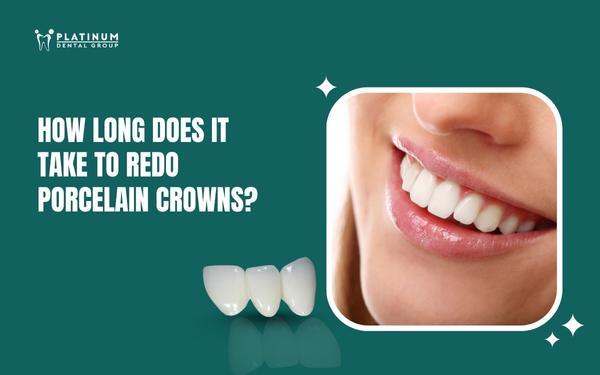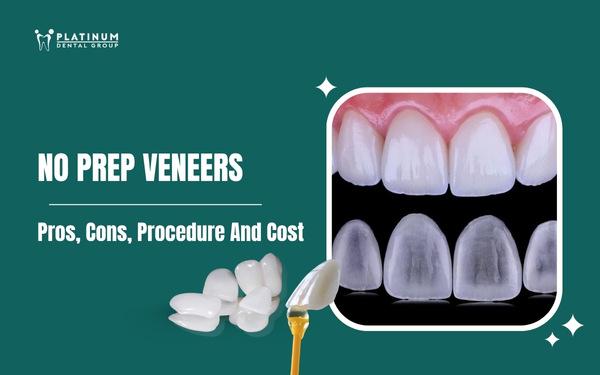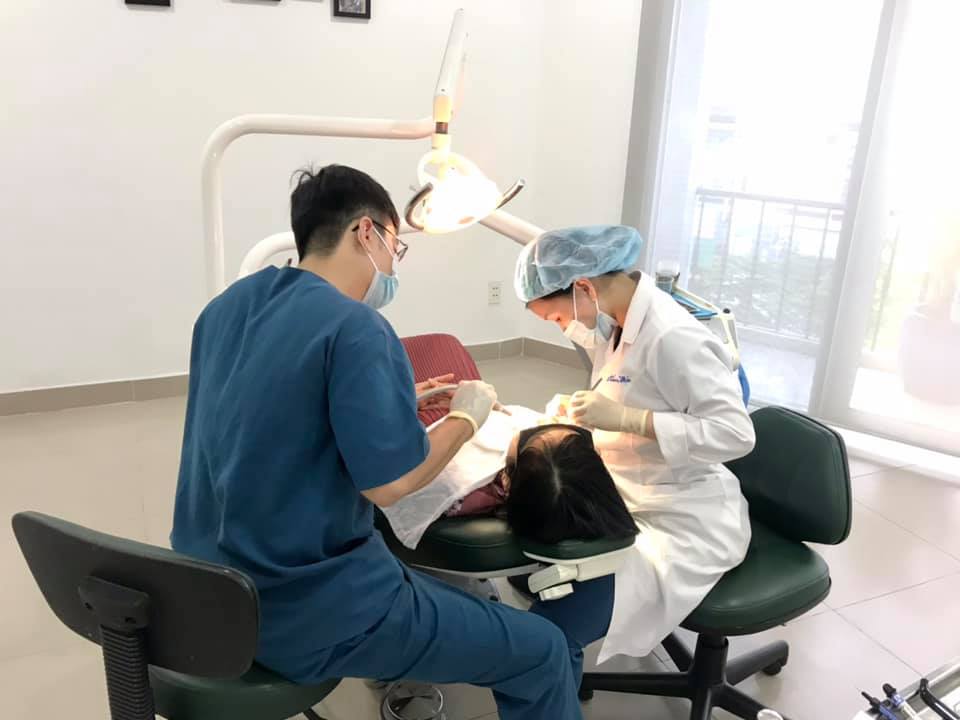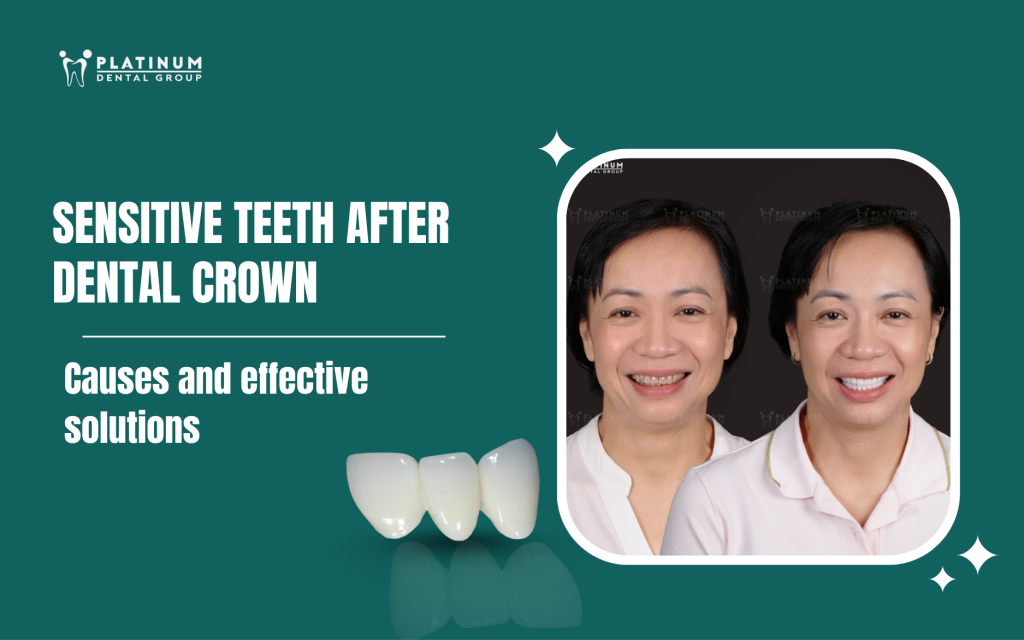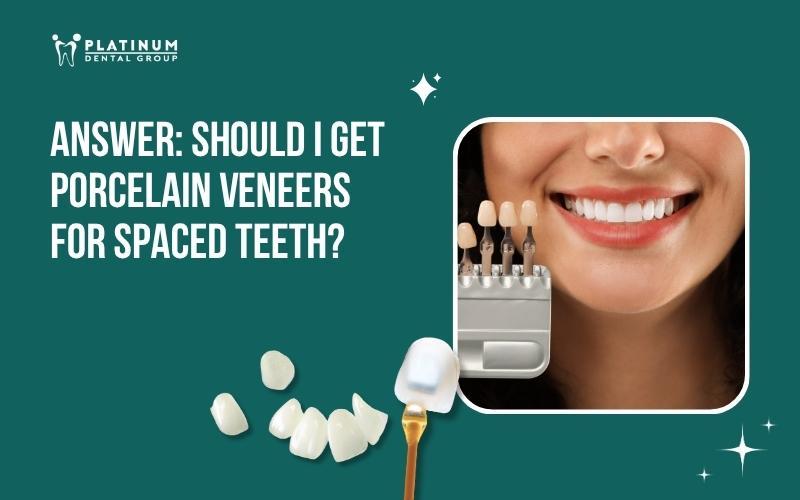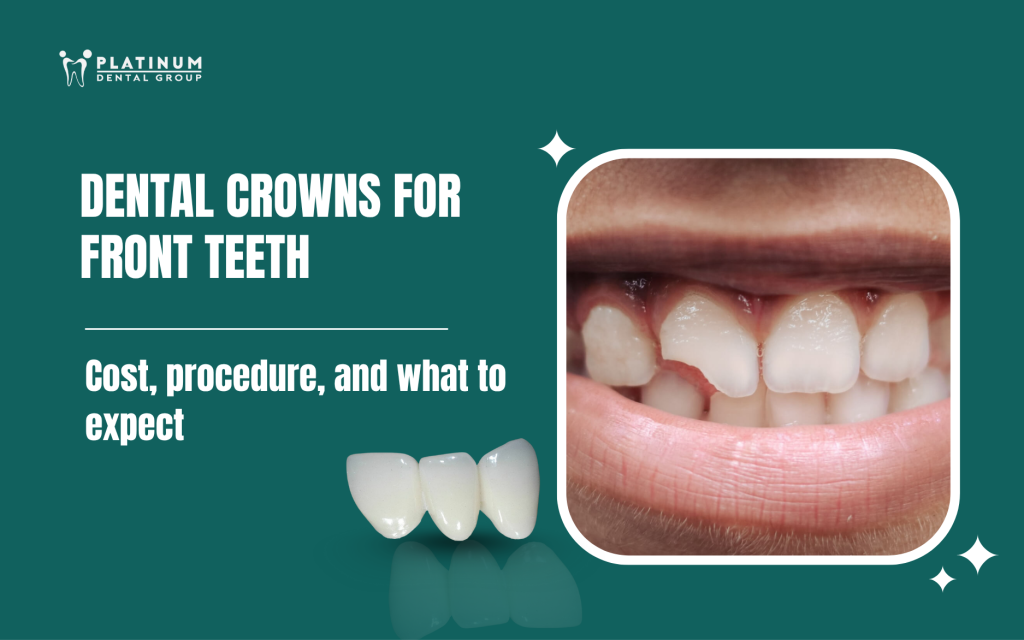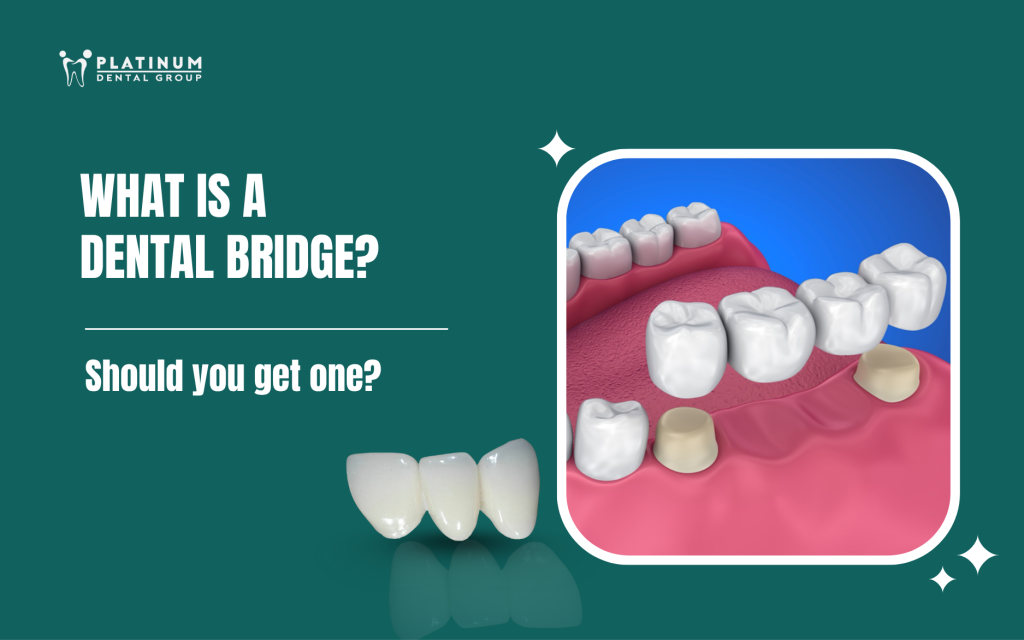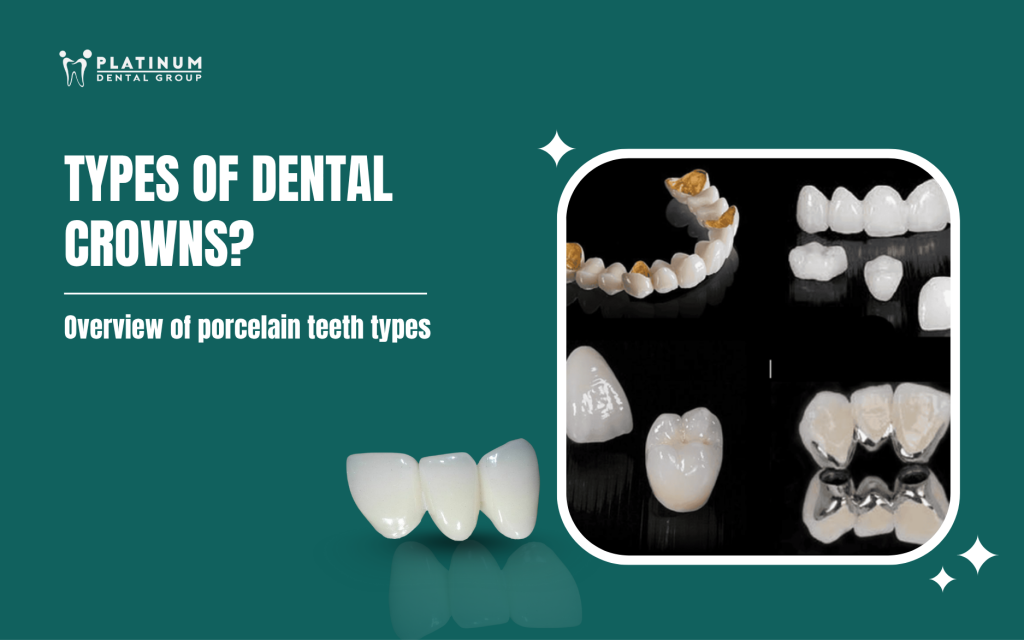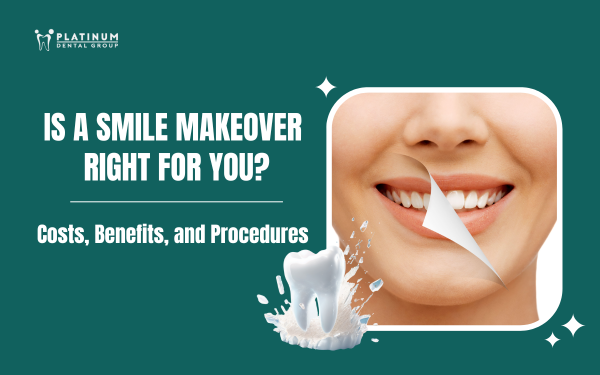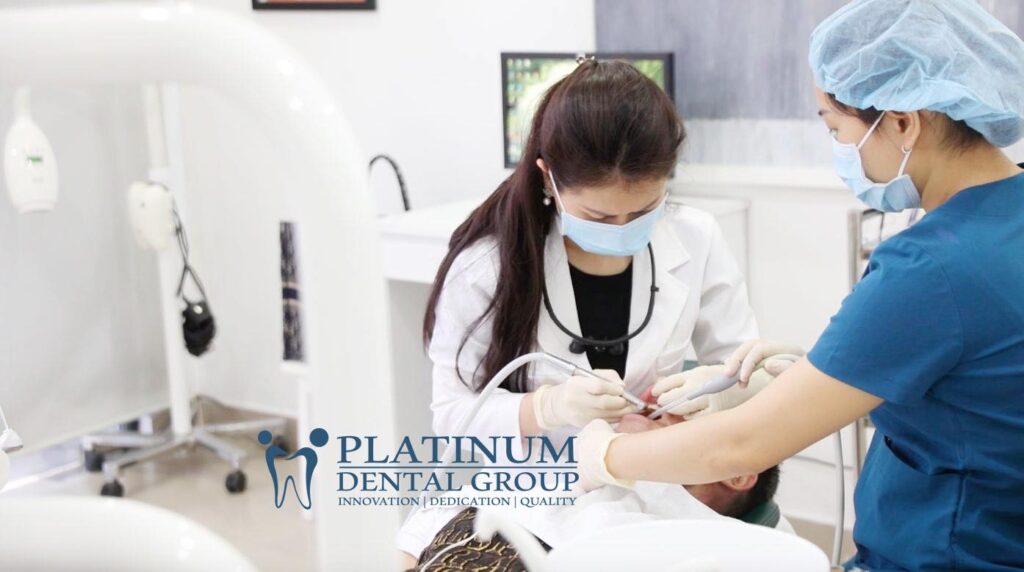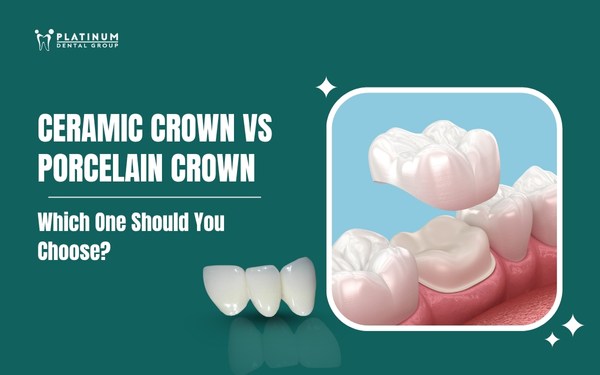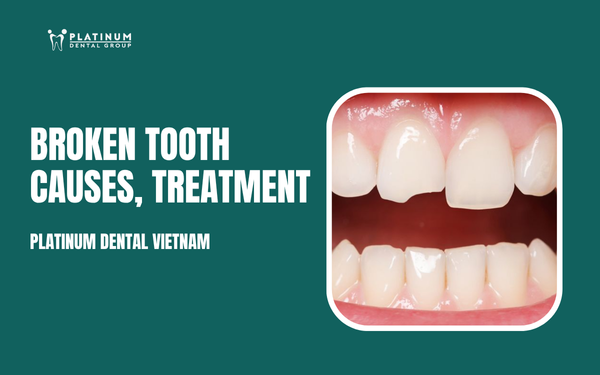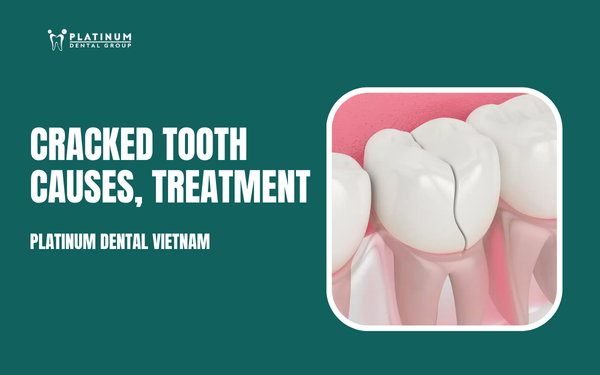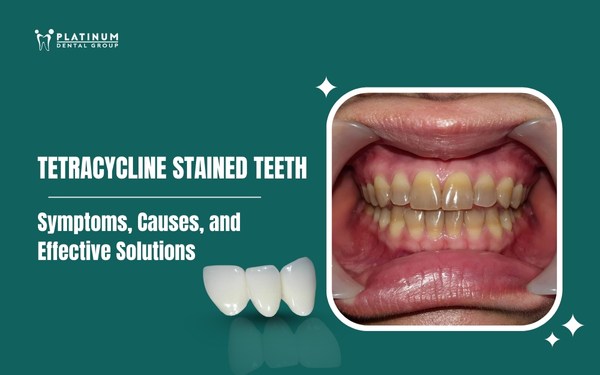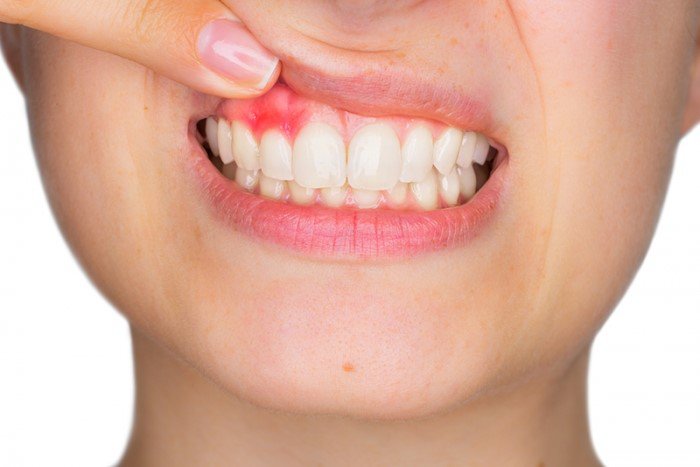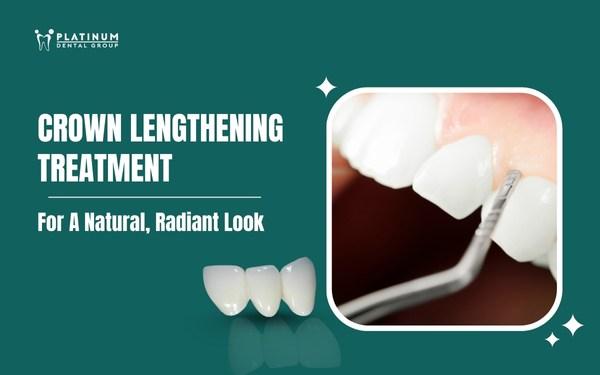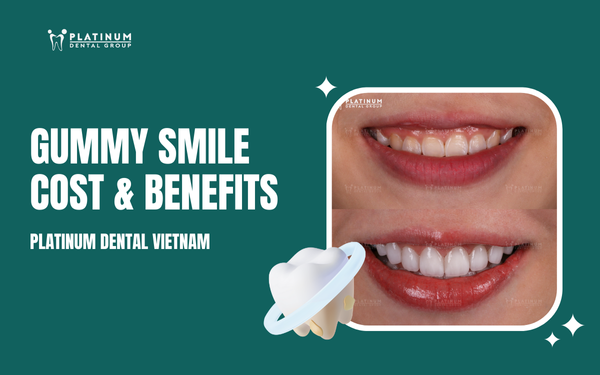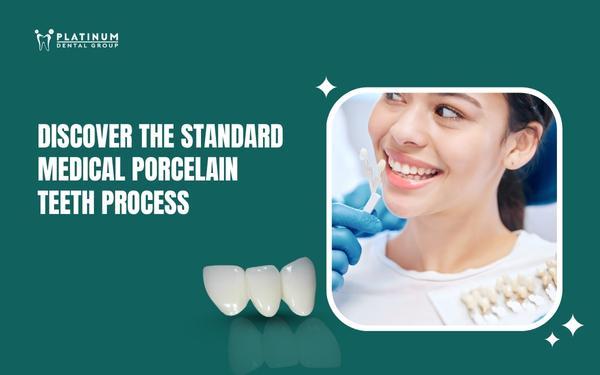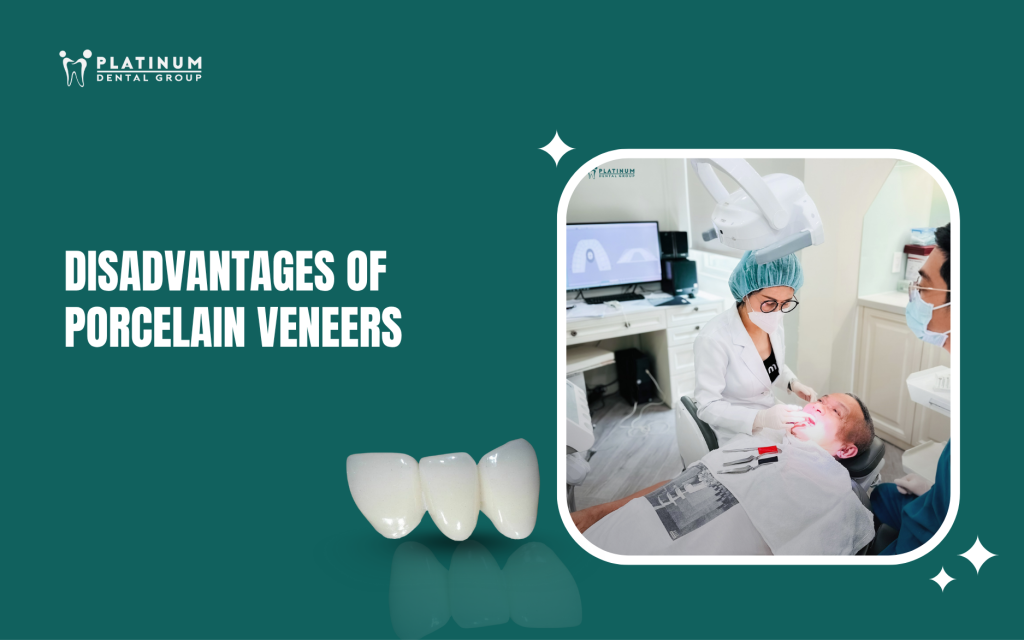How long does it take to redo porcelain crowns? Expert Insights from a Doctor
A bright smile with beautiful, even teeth helps the face look younger and more confident. Porcelain crowns are the solution chosen by many people to both improve aesthetics and protect real teeth. However, many customers worry: “Are porcelain teeth durable? How long does it take to redo porcelain crowns?”. The answer lies not only in the porcelain material, but also depends on the dentist’s skills and your own care. Let’s find out the details with Platinum Dental Group in the article below to feel more secure before deciding.
Nội dung bài viết
- 1 How long does it take to redo porcelain crowns?
- 2 Factors affecting the lifespan of porcelain teeth
- 3 Signs that you need to redo porcelain teeth
- 4 How to prolong the life of porcelain teeth
- 5 Frequently Asked Questions (FAQ)
- 5.1 How long does it take to eat and drink normally after porcelain crowns?
- 5.2 Does it hurt to have porcelain crowns?
- 5.3 Can porcelain teeth be redone many times?
- 5.4 Which type of porcelain teeth should I choose when redoing?
- 5.5 How long does it take to get porcelain crowns?
- 5.6 What is the average lifespan of common types of porcelain teeth (metal porcelain, titanium porcelain, all-ceramic, zirconia porcelain)?
How long does it take to redo porcelain crowns?
The longevity of porcelain teeth is a matter of concern for many customers before deciding on restoration. In fact, porcelain teeth are not “permanent”, but if you choose the right type of porcelain crown and take good care of it, you can completely maintain beautiful teeth for many years.
According to specialists at Platinum Dental Group, the lifespan of porcelain teeth often depends on the material used to make them. Currently on the market, there are two main types of porcelain teeth: metal porcelain teeth and all-ceramic teeth.
Metal ceramic teeth are ceramic teeth with an inner frame made of Nickel – Chromium or Cobalt – Chromium alloy, the outside is covered with a layer of white ceramic, similar to the color of natural teeth. The lifespan of this type of ceramic teeth is about 5 – 7 years and after a long time of use, metal ceramic teeth will have black gum line if not well cared for.
For all-ceramic teeth made from 100% pure ceramic, no alloy. Guaranteed not to irritate the gums, keeping the teeth in shape and color as natural as real teeth. High aesthetics, does not cause blackening of the gum line after a period of use, the lifespan of all-ceramic teeth can last from 15 to 20 years.
In addition, you may have to redo porcelain teeth sooner if you encounter conditions such as cracked or chipped teeth due to impact, receding gum lines causing exposed tooth roots, prolonged pain or tooth decay, gingivitis in the real tooth pillar inside. At that time, replacement is necessary to ensure chewing and aesthetics.
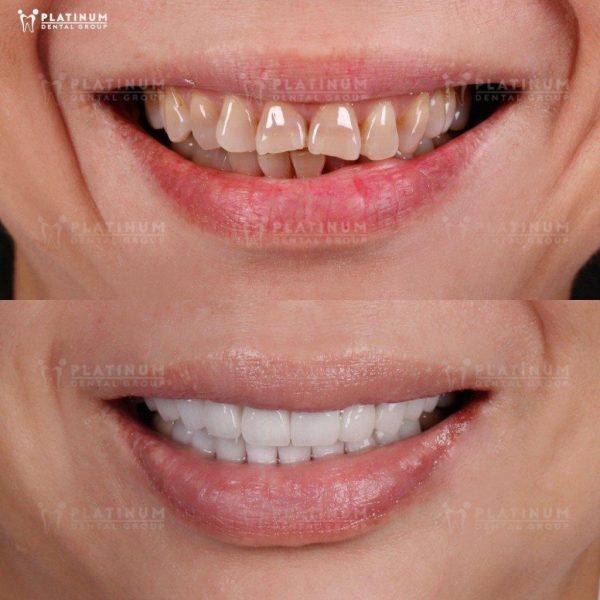
Factors affecting the lifespan of porcelain teeth
There is no fixed number for the lifespan of porcelain teeth, because it depends on many different factors. Understanding these factors will help you choose the right solution and know how to maintain porcelain teeth to be durable and beautiful for a long time.
Materials for making porcelain teeth
Material is the most important factor that determines the durability of porcelain teeth. Metal porcelain teeth with an internal frame made from Nickel – Chromium or Cobalt – Chromium alloy have a lower lifespan than all-ceramic teeth made from 100% pure porcelain, without alloy.
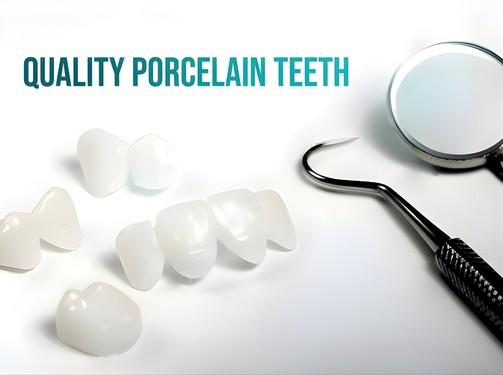
Dentist skills and techniques
Even a good quality porcelain tooth cannot be durable if the process is not precise. When the dentist grinds the tooth too much, the real tooth will be weak and vulnerable later. If the porcelain crown is not fitted tightly to the gum line, the gap will create conditions for food and bacteria to stick, causing tooth decay or gingivitis. Even the glue that attaches the porcelain crown, if not up to standard, can age quickly, causing the porcelain crown to loosen after only a few years.
Therefore, the doctor’s skill and modern manufacturing technology play a decisive role in the tightness, durability and longevity of porcelain teeth.
You should choose a reputable dental clinic with experienced doctors. At Platinum Dental Group, our team of highly qualified doctors and modern manufacturing technology will help you feel secure about long-term results.
Dental condition before crowning
The longevity of porcelain teeth also depends a lot on the initial oral condition. If the teeth are healthy, the gums are rosy and the jawbone is strong, the porcelain crown will adhere firmly and last a long time.
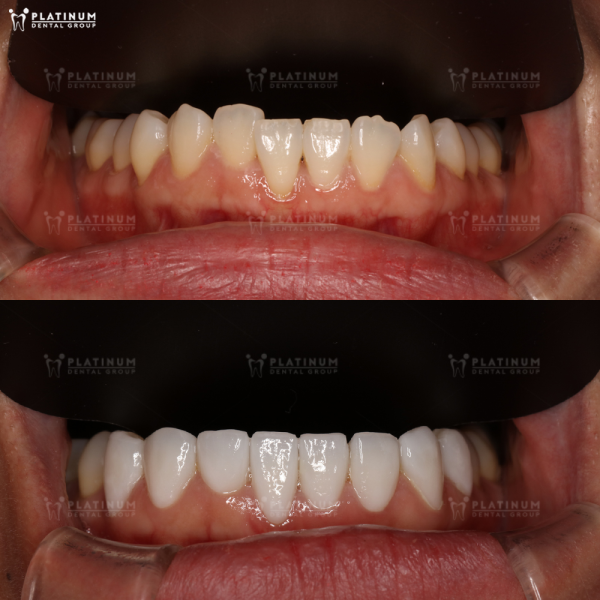
On the contrary, if the tooth has pathologies such as tooth decay, pulpitis, bone loss or weak gums, porcelain crowns are prone to complications, causing the porcelain teeth to quickly deteriorate. Therefore, before performing the procedure, the doctor needs to thoroughly examine and thoroughly treat dental problems to create a solid foundation for the porcelain crown process.
Dental care after porcelain crowns
Although porcelain teeth are durable, they still need to be properly cared for to last a long time. If oral hygiene is not good, plaque and bacteria accumulate around the gum line, causing inflammation, reducing the durability of porcelain crowns.
Therefore, you should brush your teeth at least twice a day with a soft-bristled toothbrush, combined with dental floss and antibacterial mouthwash to clean between teeth. In addition, regular check-ups at the dentist are also necessary for the doctor to check the tightness of the porcelain crown, detect early signs of abnormalities and handle them promptly.
Diet and habits
Daily habits also directly affect the lifespan of porcelain teeth. Chewing on foods that are too hard such as ice, bones or dry seeds can easily cause porcelain teeth to crack or chip. People who have the habit of grinding their teeth while sleeping or biting hard objects also face the risk of damaging their porcelain teeth faster.
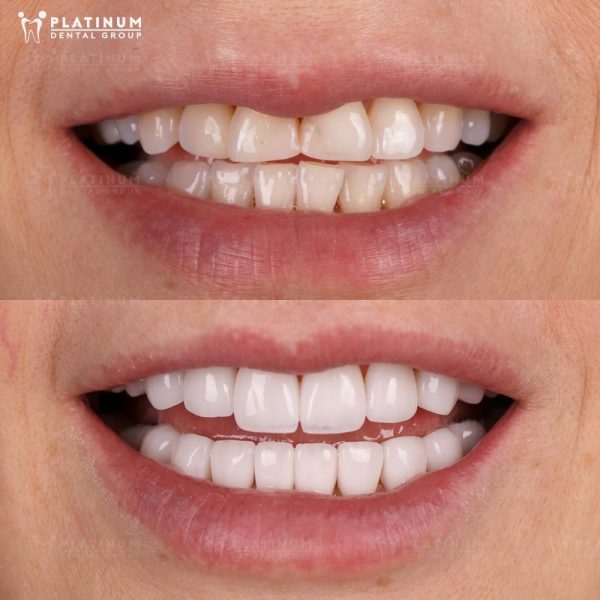
In addition, regular use of coffee, strong tea, wine or tobacco can cause porcelain teeth to become discolored and unnatural over time. Therefore, establishing a reasonable diet and adjusting daily living habits are important factors to help porcelain teeth maintain their durability and long-term aesthetic beauty.
Signs that you need to redo porcelain teeth
Porcelain teeth cannot last forever, over time there will be certain changes. Early detection of abnormal signs will help you to visit the dentist in time and avoid unwanted risks.
Chips, cracks, and breaks on impact
During eating or drinking or due to strong impact, porcelain crowns can be chipped, cracked or broken. Small cracks may not cause pain at first, but over time will affect the ability to chew and aesthetics. This is a clear sign that you need to replace a new porcelain crown to protect the real tooth inside.

Black border or aging glue layer
One of the common problems with metal ceramic teeth is that the gum line appears black due to the metal frame being oxidized. In addition, the glue that holds the ceramic crown together over time can also age and no longer adhere as firmly as before. When this condition occurs, the ceramic teeth not only lose their aesthetic appeal but also pose a risk of gaps, creating conditions for bacteria to grow.
Loose or misaligned teeth
If you feel that your porcelain tooth is loose when chewing or the porcelain crown is no longer tight with your tooth and gum, it is likely that the jawbone has changed or the adhesive has weakened. Leaving it for a long time will cause discomfort, hinder chewing function and easily damage the abutment tooth.
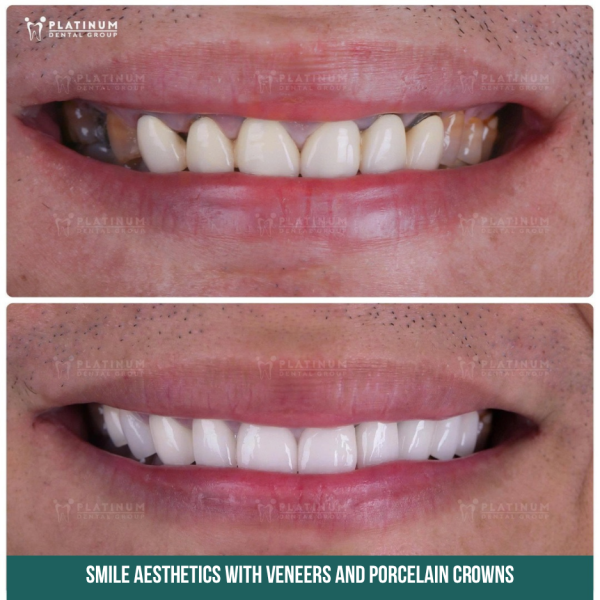
Sensitive, painful when chewing
Sensitivity or pain when biting hard, hot or cold objects is a warning sign that the porcelain tooth may have become exposed and no longer completely covers the real tooth. In some cases, this is also a sign of pulpitis or underlying disease that has not been completely treated. At this time, you need to see a doctor for examination and timely treatment.
Discoloration or darkening
Although all-ceramic teeth have good resistance to staining, if used for a long time or not cleaned properly, the color of the teeth can become dull, losing its natural clarity and brightness. For metal-ceramic teeth, discoloration often occurs more quickly. This is when you should consider replacing them to maintain a bright smile.
Gingivitis or pain and swelling around the crown
Red, swollen, bleeding or painful gums around the edges of the crown are often signs that the crown is no longer snug or that bacteria has invaded. If not treated early, gingivitis can progress to a more severe stage, directly affecting the oral health and the underlying abutment teeth.
How to prolong the life of porcelain teeth
Porcelain teeth can last for 10-20 years or more if properly cared for. In addition to choosing quality porcelain teeth and having them done at a reputable dental clinic, your daily hygiene habits and lifestyle also greatly determine the longevity of porcelain crowns. Below are simple but effective tips to keep porcelain teeth strong and aesthetically pleasing for a long time.
Proper care after porcelain crowns
Immediately after porcelain crowns, you need to maintain a scientific oral hygiene routine. Brush your teeth at least twice a day with a soft-bristled toothbrush to avoid scratching the porcelain surface. Combined with dental floss and antibacterial mouthwash, it will help remove plaque and leftover food between teeth, where the toothbrush is often difficult to reach. This regular care not only protects the porcelain crown but also keeps your real teeth and gums healthy.
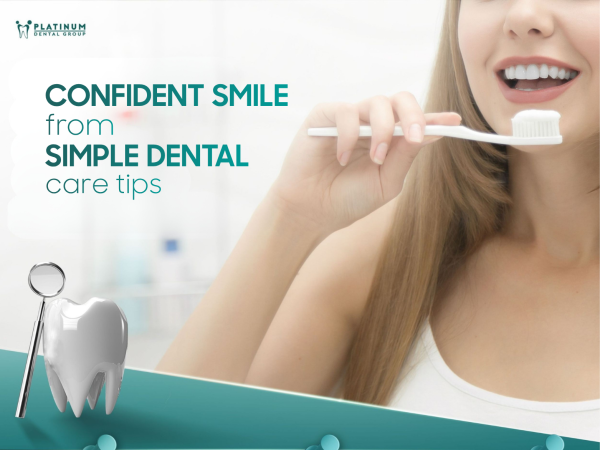
Limit harmful foods
To maintain the bright and beautiful color of porcelain teeth, you should limit foods and drinks that easily cause discoloration such as coffee, strong tea, wine or tobacco. At the same time, avoid chewing foods that are too hard such as ice, bones or dry seeds, because strong biting force can crack or chip porcelain crowns. Instead, prioritize a healthy diet with lots of green vegetables, vitamin-rich fruits and soft, easy-to-chew foods, which are both good for overall health and protect your teeth.
Regular check-ups
Regular dental check-ups every 6 months are an important habit to prolong the life of porcelain teeth. During each visit, the doctor will check the tightness of the porcelain crown, promptly detecting problems such as gingivitis, exposed edges or loose porcelain teeth. If there are any abnormalities, early treatment will help you avoid complicated and expensive interventions later. In addition, regular scaling also keeps the oral cavity clean, minimizing the risk of infection around the porcelain crown.
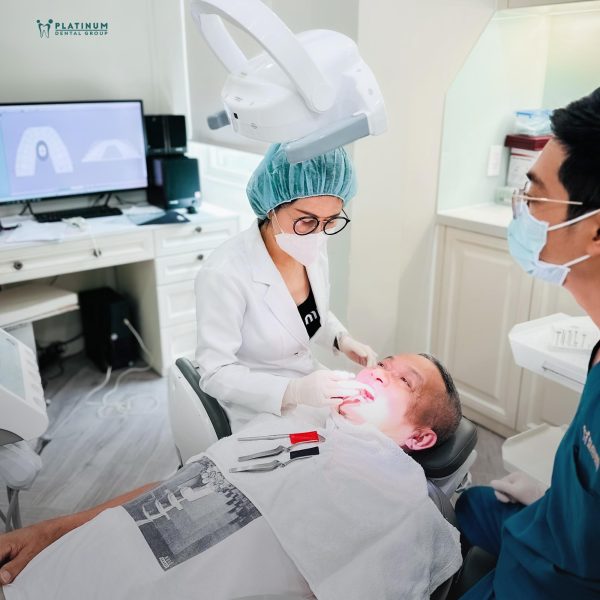
Use protective gear when needed
For those who have a habit of grinding their teeth while sleeping or regularly participate in sports, using a mouth guard is necessary. Anti-grinding mouth guards help reduce pressure on porcelain crowns, limiting cracking and chipping due to impact or strong squeezing force. This is a small solution but brings great efficiency, helping porcelain teeth stay strong throughout the time of use.
Frequently Asked Questions (FAQ)
How long does it take to eat and drink normally after porcelain crowns?
Normally, after about 24 – 48 hours of porcelain crowns, you can eat and drink normally again. However, in the first few days, you should prioritize soft, easy-to-chew foods to give your teeth and gums time to adapt.
Does it hurt to have porcelain crowns?
Porcelain crowns are usually performed under anesthesia, so they are virtually painless. You may experience some slight discomfort or pain for the first few days, but this will quickly disappear.
Can porcelain teeth be redone many times?
You can completely re-cover your teeth with porcelain many times if the abutment teeth inside are still strong. However, the number of times will depend on the condition of your real teeth, gums and jawbone, so you need to be carefully examined by a doctor before deciding.
Which type of porcelain teeth should I choose when redoing?
If you want to maintain long-term and ensure aesthetics, you should prioritize all-ceramic teeth such as E.max or Zirconia. These are materials with high durability, natural color and less discoloration over time.
How long does it take to get porcelain crowns?
The average lifespan of porcelain crowns is usually 7-15 years, depending on the type of crown and how it is cared for. If you notice any unusual signs such as loose teeth, pain or discoloration, you should go to the dentist for an examination and replacement sooner.
What is the average lifespan of common types of porcelain teeth (metal porcelain, titanium porcelain, all-ceramic, zirconia porcelain)?
- Metal ceramic teeth: 5 – 7 years.
- E.max all-ceramic teeth: 10 – 15 years.
- Zirconia all-ceramic teeth: 15 – 25 years or more if well cared for.
Porcelain crowns not only improve aesthetics but also ensure long-term sustainable chewing function. However, to achieve optimal results, you need to choose a reputable dental facility, a team of experienced doctors and high-quality porcelain materials. At Platinum Dental Group, each customer is examined in detail with modern machinery, personalized treatment plans and a commitment to bring confident, radiant smiles.
If you are experiencing deterioration of your porcelain teeth or need to have them re-covered, contact Platinum Dental Group immediately for a free consultation and appointment. Don’t let minor dental problems affect your confidence and oral health!
>> Learn more:
- Core principles of Implant Dentistry
- Core concepts and options for Veneers teeth
- General pricing information for tooth Implant cost
- Basic concepts and applications of crown teeth
- Important information about all on 4 Dental Implants near me
- Overview of full mouth Dental Implants
Platinum Dental Group
Clinic Locations:
📍Platinum Dental Central: 127 Nguyen Cu Trinh Street, Cau Ong Lanh Ward, Ho Chi Minh City
📍Platinum Dental Thao Dien: 1H Street 10, An Khanh Ward, Ho Chi Minh City
📞 Hotline: (+84) 28 3920 9969 | 096 779 7799
✉️ Email: info@platinumdentalvietnam.com
🌐 Website: https://platinumdentalvietnam.com/
💬 Instagram: https://www.instagram.com/platinumdental.vietnam/
🔗 Facebook: https://www.facebook.com/platinumdentalvn



 Tiếng Việt
Tiếng Việt